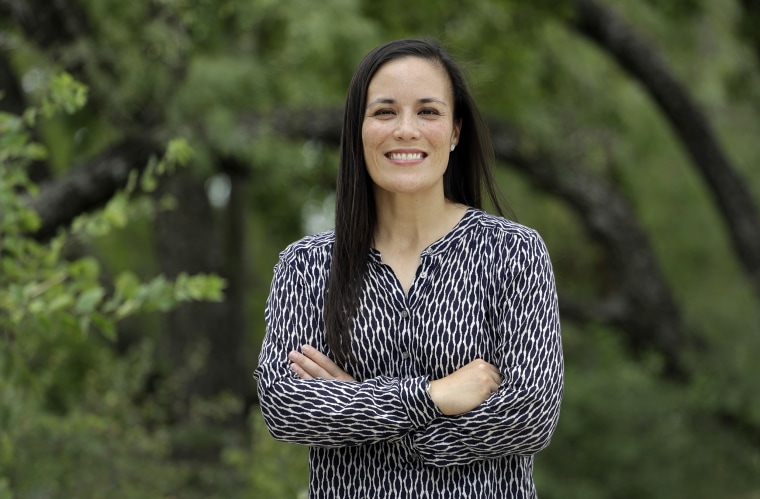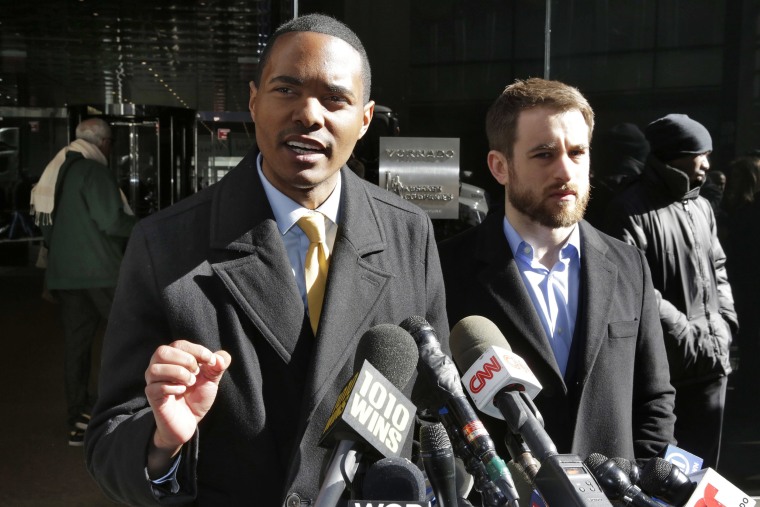Political Candidates Face Uptick in Anti-LGBTQ Attack Ads
State Rep. Brianna Titone, who made history in 2018 when she became the first transgender lawmaker in Colorado, is now running for her second term. But while her platform focuses on the bread-and-butter issues of transportation, education and jobs, her opponents have targeted her gender identity.
The group Take Back Colorado released a Facebook ad this month that misgenders Titone and refers to her by her “deadname,” the name she used before her transition. The ad also claims Titone has “always supported violence” and sexualizes children.
“It’s just a nasty, transphobic ad that’s blatantly full of lies,” Titone told NBC News.
Take Back Colorado is registered to Joe Neville, the brother of Patrick Neville, the Republican state House minority leader. When questioned by The Denver Post, Patrick Neville denied the ad was transphobic, saying it simply showed “the facts.”
Titone said the strategy backfired. She raised $11,000 in the 36 hours after the ad ran —about 20 percent of all online contributions to her campaign this cycle — and said she now had contributions from 43 out of 50 states.
“I’m getting support from places all over the country now,” she said. “People recognized that there was a group of people trying to beat up someone who is doing a really good job.”
Related
Over 500 LGBTQ candidates to appear on November ballots, shattering records
Titone is not the only target of anti-LGBTQ political ads. Many LGBTQ candidates this cycle have been subjected to such attacks, prompting advocates to worry that it has become a trend.
“The homophobic and transphobic attacks on LGBTQ candidates are more frequent and more direct than we have seen in at least a decade,” said former Houston Mayor Annise Parker, who now runs the LGBTQ Victory Fund, a national organization that trains and promotes LGBTQ political candidates.
“The dog whistles of the last few cycles are still prominent, but they are secondary to more direct and blatant uses of anti-LGBTQ stereotypes that weaponize our sexualities in an effort to derail campaigns,” Parker added. “LGBTQ candidates are being falsely called ‘pedophiles,’ ‘sexual predators’ and ‘drug users.’ They are being told they are ‘deplorable’ and should ‘go to church.’ They are being misgendered. And their dating histories — including their use of dating apps — have become the targets of opponents.”
Competitive races
Many of the attacks are happening in close races in competitive districts, like Titone’s.
“My race was one of the hardest races to win in 2018, and I’m a top targeted seat in the House right now,” Titone said of the Colorado House of Representatives.
Gabriele Magni, an assistant professor of political science at Loyola Marymount University in Los Angeles, said homophobic and transphobic attack ads “can be especially powerful and especially hurtful in districts that are not very progressive to start with.”
“They can bring out fear in the electorate,” Magni said. “It’s from an old playbook … trying to create fear about what can happen if transgender people are in office, or if people who are allies with transgender people are in office.”
Magni added that anti-LGBTQ attack ads are actually “validation of the strength and competitiveness of LGBTQ candidates.”
At least 574 LGBTQ candidates will be on the ballot next month, according to the Victory Fund. Fifteen of those candidates are running for Congress, and several of those races are hotly contested.

Gina Ortiz Jones, who’s running in Texas’ 23rd Congressional District, has been the subject of attacks funded by the National Republican Campaign Committee. The committee ran an ad last week implying that Jones, a U.S. Air Force veteran, would put military “patriots out of work” so she could “divert military money for transgender reassignment surgeries.”
In August, HuffPost reported that the committee had been encouraging outside groups to remind Texas voters in Jones’ swing district about her sexual orientation.
“The national fundraising arm of the Republican Party has declared war on LGBTQ candidates this election cycle — and homophobia and transphobia are their weapon of choice,” Parker said. “It is despicable that Republicans would attack a military veteran simply because she believes the trans soldiers who risked their lives beside her deserve fair treatment when they return home.”

Jon Hoadley, an openly gay congressional candidate in Michigan, has been the subject of an attack ad from the Congressional Leadership Fund, a PAC dedicated to electing Republicans to Congress, that has been criticized as homophobic. The ad makes reference to Hoadley’s sexual history and calls his judgment “disturbing.” Hoadley is running against an incumbent Republican, Fred Upton, who has not denounced the advertisement.
The ad drew from Hoadley’s personal blog that he kept in his early 20s. On the now-deleted blog, Hoadley wrote about going to a gay bar and mentioned “a four year old wearing a thong” in a post about a friend’s wedding. Hoadley has apologized in a Facebook video for any misunderstanding stemming from the posts.
Chris Pack, a spokesperson for the National Republican Campaign Committee, defended the ads.
Holding Hoadley accountable for “his disgusting comments about toddlers in thongs has nothing to do with his sexual orientation,” Pack told NBC News, “and the same is true regarding Gina Jones wanting to divert money from the military to foot the bill for transgender reassignment procedures.”
Progressive strongholds
Personal attacks on LGBTQ candidates can also occur in progressive strongholds.
Ritchie Torres, who is a shoo-in to win his seat in New York’s 15th Congressional District and become the first Afro-Latinx LGBTQ person in Congress, was called derogatory names on social media that many interpreted to be homophobic.
Torres was called a “first class whore” in a now deleted tweet by Ed Mullins, an officer with the New York Police Department and president of the Sergeants Benevolent Association.
The comments came after Torres criticized the NYPD amid an increase in gun violence. Mullins said his comments “had nothing to do” with Torres’ “race, ethnicity or sexual orientation.”
“My comments had everything to do with his dangerous policies and worldview,” Mullins stated. “The city is burning and Councilman Torres wants to blame the police.”

Magni said attacks like this are not surprising. He said that many of the attacks this cycle are “based on homophobic tropes” that cast gay men as promiscuous or sexual predators.
“American voters are OK with LGBTQ candidates if LGBTQ candidates are sexless,” Magni said.
Despite Torres’ near guaranteed win in November, personal attacks could still have a negative impact.
“The way homophobic attacks work in progressive strongholds … is by hurting candidates in an indirect way,” Magni said. “Some of these attacks isolate LGBTQ candidates and force some allies to distance themselves.”
Like-minded organizations might put endorsements on hold or volunteers and donors may pause contributions, causing LGBTQ candidates to “lose access to resources and allies that are needed at critical moments,” Magni added.
Recommended
OUT NEWSTiffany Trump says her father ‘has always supported’ LGBTQ people
OUT NEWSTexas social workers can now turn away LGBTQ, disabled clients
The idea, Magni said, is to “burn all the bridges around the candidate.”
“That is why I think it’s important to respond quickly to these attacks and unmask them for what they are — baseless claims,” Magni said.
Intersectional attacks
This year, more LGBTQ candidates of color are running than ever before. This means more candidates are vulnerable to comments that attack not only their sexual orientation or gender identity, but also their race.
For example, openly gay Illinois state House candidate Ken Mejia-Beal has been subjected to comments from his opponent, Republican Rep. Amy Grant, that target his race and sexuality.
On a recorded fundraising call over the summer, Grant said, “That’s all we need is another person in the Black Caucus.” She went on to say: “I just think that maybe he’s afraid of the reaction that people might give him. Not because he’s Black, but because of the way he talks. He’s all LGBTQ.”
Equality Illinois, a statewide LGBTQ advocacy group, condemnedthe remarks as “racist and homophobic.”
Grant subsequently apologized, saying she “deeply regret[s] the comments” and added that they “do not reflect my heart or my faith.”
Related
Texas social workers can now turn away LGBTQ, disabled clients
Mejia-Beal, however, does not buy Grant’s apology and said she’s out of touch with the people in his district. “She is not a nice person,” he said, adding that Grant’s comments reflect racist and bigoted beliefs.
Grant’s campaign also circulated a mailer insinuating that Mejia-Beal was connected to a cover-up of a sexual assault over a decade ago.
“Right out of the gate, when she started attacking me, I didn’t understand where it was coming from,” Mejia-Beal said. “When I heard the audio, that’s when I had the a-ha moment.”
Mejia-Beal’s opponents may have perceived his candidacy as more vulnerable to attacks because of his multiple marginalized identities.
Magni recently conducted research exploring voters’ reactions to LGBTQ candidates and found that gay men — particularly Black gay men — were the most likely to be penalized by voters.
“In the U.S., Black candidates are penalized more than white candidates for being gay, in addition to the separate, individual penalties that they face for sexual orientation and race,” he said.
He added that this penalty “does not come from Black voters.” When compared to white voters, he added, “Black voters are now more supportive overall of LGBTQ candidates, since LGBTQ candidates tend to be Democrats.”
Personal safety
Personal attacks can also threaten LGBTQ candidates’ personal safety.
Jenna Wadsworth, an openly bisexual candidate for North Carolina’s commissioner of agriculture, received rape and death threats after posting a TikTok video criticizing President Donald Trump, according to the Advocate.
Todd Gloria, a member of the California State Assembly and candidate for mayor in San Diego, also received threats of physical violence that his campaign said were incited by his opponent, fellow Democrat Barbara Bry.
Related
Biden calls anti-trans violence an ‘epidemic that needs national leadership’
Gloria came under criticism after he voted for SB 145, a bill that addresses anti-LGBTQ discrimination in the application of the sex offender registry.
“We have reported the threats to the San Diego Police Department, and they are currently investigating,” Gloria said in a statement. “While I refuse to let this paralyze our campaign, voters deserve to know that this is what Barbara Bry’s campaign is inspiring. Her campaign is bringing out the worst of who we are. We are so much better than this, and San Diegans should hold her and her campaign accountable this November.”
Bry’s campaign disputed Gloria’s claims and stressed that Bry is a “long-time supporter of LGBTQ rights.”
“While she disagrees with Todd Gloria on the issue of requiring those convicted of sexual assault on children to be placed on the state’s sex offender registry, regardless of sexual orientation, her campaign has never raised this issue in campaign advertising,” Tom Shepard, Bry’s campaign consultant, told NBC News in an email. “This controversy is a result of verbal attacks on Gloria by a rival leader in San Diego’s LGBTQ community, who criticized Gloria’s vote on this issue.”
Non-LGBTQ targets
Targets of homophobic or transphobic ads may not even be LGBTQ. For example, the American Principles Project, a conservative think tank and PAC, released an ad targeting presidential candidate Joe Biden and Sen. Gary Peters, D-Mich., alleging that they support “policies which would allow biological males to compete in women’s sports and push children into dangerous, life-altering sex-change” procedures.
Magni said such ads are designed to “galvanize the most conservative base,” so these voters turn out on Election Day. The idea is to depict Biden and Peters “as out-of-touch liberals who threaten ‘traditions,’” Magni said.
‘Chilling effects’
While a record number of LGBTQ candidates are running for office this year, some advocates fear anti-LGBTQ attacks could derail this progress.
“The last few election cycles we have seen the number of LGBTQ candidates increase dramatically, but this trend is not inevitable,” Parker said. “Already we are hearing from LGBTQ elected officials that they may not seek higher office because they don’t want to expose their loved ones and families to these deeply personal attacks.”
Magni said these attacks could have a long-lasting impact.
“The damage that is done is not only to candidates right now but the potential chilling effects among younger LGBTQ people who are thinking about running,” he said. “It’s not only about scrutiny. Their personal lives are going to be distorted. Their dating lives are going to be weaponized … It makes them think twice.”
For her part, Titone is determined to keep campaigning and support the presence of other transgender women in office.
“When you are only 1 of 4 transgender legislators in the whole county, representation matters,” Titone said. “We cannot take a step back in trans representation at this point.”